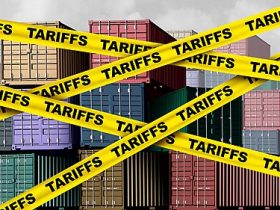Ilya Somin
This commentary was originally published in The Volokh Conspiracy at Reason.com.
On April 14, the Liberty Justice Center and I filed a lawsuit in the US Court of International Trade challenging the legality of Donald Trump’s gargantuan “Liberation Day” tariffs, on behalf of five US businesses that import goods from many of the countries targeted by the tariffs. The case is entitled VOS Selections, Inc. v. Trump.
In previous posts, I previewed our key arguments and explained why Trump’s partial pause of the tariffs does not end the madness or obviate the need to challenge this usurpation of legislative power in court.
To briefly summarize, we argue that the International Emergency Economic Powers Act of 1977 (IEEPA) doesn’t authorize tariffs at all, that even if it does the bilateral trade deficits targeted by the “Liberation Day” tariffs do not qualify as an “emergency” or as an “unusual and extraordinary threat” (both prerequsites to invoking IEEPA), that Trump’s use of IEEPA for this purpose runs afoul of the “major questions” doctrine, and that—if these actions are authorized by IEEPA—it would violate constitutional limits on delegation of legislative power to the executive. If we prevail on any one of these points, we win the case.
The complaint is available here.
Here is an excerpt from the Liberty Justice Center press release announcing the case:
On April 14, the Liberty Justice Center filed a lawsuit challenging the Trump Administration’s authority to unilaterally issue the “Liberation Day” tariffs, which are devastating small businesses across the country. The lawsuit argues that the Administration has no authority to issue across-the-board worldwide tariffs without congressional approval.
The lawsuit, filed in the U.S. Court of International Trade, highlights the unprecedented nature of the tariffs, including a global 10% tariff on nearly all imports, with additional higher tariffs targeting dozens of countries based on dubious calculations of foreign trade barriers.
The President invoked the International Emergency Economic Powers Act (IEEPA) to justify the “Liberation Day” tariffs, as well as the tariffs on Mexico, Canada, and China. But under that law, the President may invoke emergency economic powers only after declaring a national emergency in response to an “unusual and extraordinary threat” to national security, foreign policy, or the U.S. economy originating outside of the United States. The lawsuit argues that the Administration’s justification— a trade deficit in goods—is neither an emergency nor an unusual or extraordinary threat. Trade deficits have existed for decades, and do not constitute a national emergency or threat to security. Moreover, the Administration imposed tariffs even on countries with which the U.S. does not have a trade deficit, further undermining the administration’s justification.
And as the Complaint explains, IEEPA does not authorize the President to impose across-the-board tariffs—it does not even authorize tariffs at all; and even if the IEEPA did extend such power to the President, that would be an unconstitutional delegation of Congress’s power to impose tariffs.
“No one person should have the power to impose taxes that have such vast global economic consequences,” said Jeffrey Schwab, Senior Counsel at the Liberty Justice Center. “The Constitution gives the power to set tax rates—including tariffs—to Congress, not the President.”
“If starting the biggest trade war since the Great Depression based on a law that doesn’t even mention tariffs is not an unconstitutional usurpation of legislative power, I don’t know what is,” said Ilya Somin, co-counsel, law professor, Scalia Law School, George Mason University.
The case is filed on behalf of five owner-operated businesses who have been severely harmed by the tariffs and highlights the human and economic toll of unchecked executive power….








